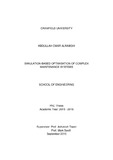JavaScript is disabled for your browser. Some features of this site may not work without it.
| dc.contributor.advisor | Tiwari, Ashutosh | |
| dc.contributor.advisor | Savill, Mark A. | |
| dc.contributor.author | Alrabghi, Abdullah Omar | |
| dc.date.accessioned | 2016-02-11T16:33:55Z | |
| dc.date.available | 2016-02-11T16:33:55Z | |
| dc.date.issued | 2015-09 | |
| dc.identifier.uri | http://dspace.lib.cranfield.ac.uk/handle/1826/9694 | |
| dc.description.abstract | There is a potential as well as a growing interest amongst researchers to utilise simulation in optimising maintenance systems. The state of the art in simulation-based optimisation of maintenance was established by systematically classifying the published literature and outlining main trends in modelling and optimising maintenance systems. In general, approaches to optimise maintenance varied significantly in the literature. Overall, these studies highlight the need for a framework that unifies the approach to optimising maintenance systems. Framework requirements were established through two main sources of published research. Surveys on maintenance simulation optimisation were examined to document comments on the approaches authors follow while optimising maintenance systems. In addition, advanced and future maintenance strategies were documented to ensure it can be accommodated in the proposed framework. The proposed framework was developed using a standard flowchart tool due to its familiarity and ability to depict decision structures clearly. It provides a systematic methodology that details the steps required to connect the simulation model to an optimisation engine. Not only it provides guidance in terms of formulating the optimal problem for the maintenance system at hand but it also provides support and assistance in defining the optimisation scope and investigating applicable maintenance strategies. Additionally, it considers current issues relating to maintenance systems both in research and in practice such as uncertainty, complexity and multi-objective optimisation. The proposed framework cannot be applied using existing approaches for modelling maintenance. Existing modelling approaches using simulation have a number of limitations: The maintenance system is modelled separately from other inter-related systems such as production and spare parts logistics. In addition, these approaches are used to model one maintenance strategy only. A novel approach for modelling maintenance using Discrete Event Simulation is proposed. The proposed approach enables the modelling of interactions amongst various maintenance strategies and their effects on the assets in non-identical multi-unit systems. Using the proposed framework and modelling approach, simulation-based optimisation was conducted on an academic case and two industrial cases that are varied in terms of sector, size, number of manufacturing processes and level of maintenance documentation. Following the structured framework enabled discussing and selecting the suitable optimisation scope and applicable maintenance strategies as well as formulating a customised optimal problem for each case. The results of the study suggest that over-looking the optimisation of maintenance strategies may lead to sub-optimal solutions. In addition, this research provides insights for non-conflicting objectives in maintenance systems. | en_UK |
| dc.language.iso | en | en_UK |
| dc.publisher | Cranfield University | en_UK |
| dc.rights | © Cranfield University, 2015. All rights reserved. No part of this publication may be reproduced without the written permission of the copyright holder. | en_UK |
| dc.subject | Simulation | en_UK |
| dc.subject | Optimisation | en_UK |
| dc.subject | Maintenance | en_UK |
| dc.subject | Complex systems | en_UK |
| dc.subject | Manufacturing | en_UK |
| dc.subject | Industrial case studies | en_UK |
| dc.title | Simulation-based optimisation of complex maintenance systems | en_UK |
| dc.type | Thesis or dissertation | en_UK |
| dc.type.qualificationlevel | Doctoral | en_UK |
| dc.type.qualificationname | PhD | en_UK |
